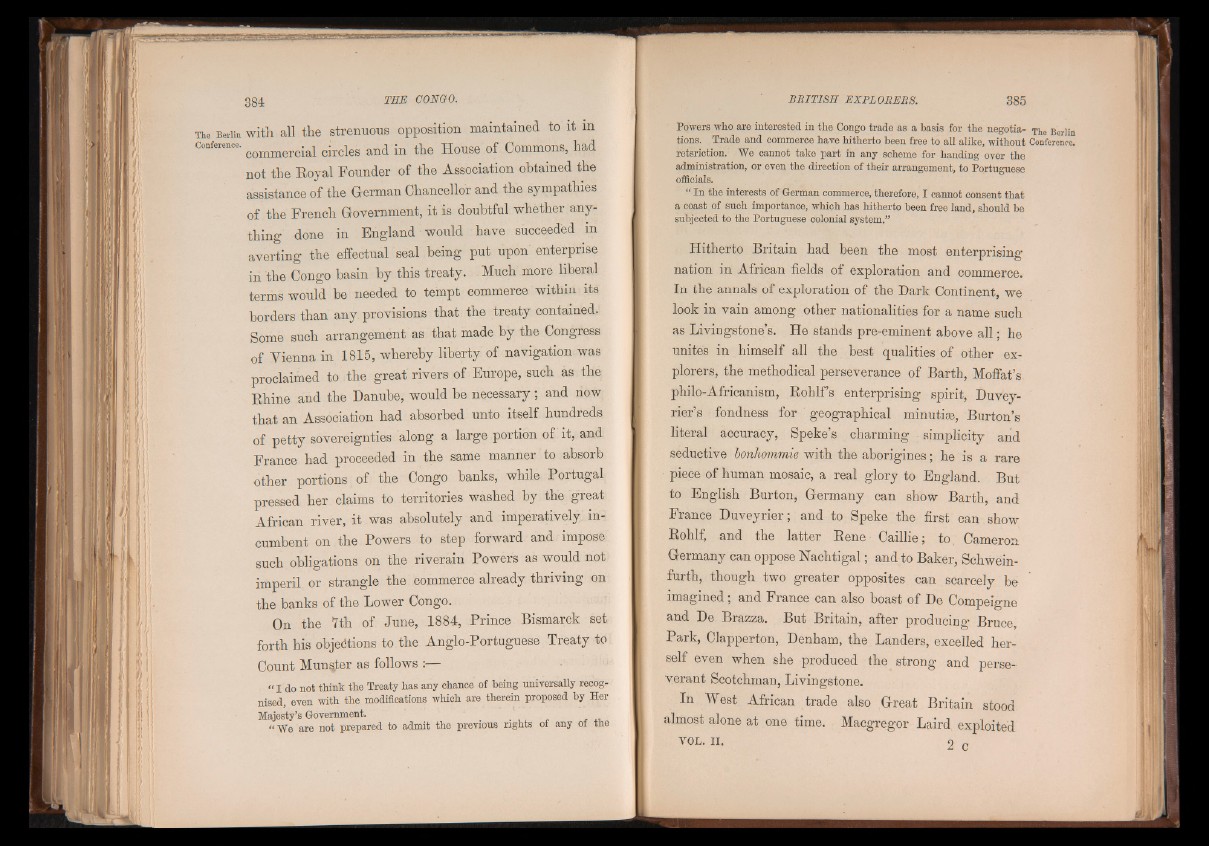
The Berlin with all the strenuous opposition maintained to it in
Conference. commercial circleg ancL in the House of Commons, had
not the Royal Founder of the Association obtained the
assistance of the German Chancellor and the sympathies
of the French Government, it is doubtful whether anything
done in England would have succeeded in
averting the effectual seal being put upon enterprise
in the Congo basin by this treaty. Much more liberal
terms would be needed to tempt commerce within its
borders than any. provisions that the treaty contained.
Some such arrangement as that made by the Congress
of Yienna in 1815, whereby liberty of navigation was
proclaimed to the great, rivers of Europe, such as the
Rhine and the Danube, would be necessary ; and now
that an Association had absorbed unto itself hundreds
of petty sovereignties along a large portion of it, and
France had proceeded in the same manner to absorb
other portions of the Congo banks, while Portugal
pressed her claims to territories washed by the great
African river, it was absolutely and imperatively incumbent
on the Powers to step forward and impose
such obligations on the riverain Powers as would not
imperil or strangle the commerce already thriving on
the banks of the Lower Congo.
On the 7th of June, 1884, Prince Bismarck set
forth his objedtions to the Anglo-Portuguese Treaty to
Count Munster as follows :—
“ I do not OlinV the Treaty has any chance of being universally recognised,
even with the modifications which are therein proposed by Her
Majesty’s Government. '
“ We are not prepared to admit the previous rights of any of the
Powers who are interested in the Congo trade as a basis for the negotia- The Berlin
tions. Trade and commerce have hitherto been free to all alike, without Conference,
retsriction. We cannot take part in any scheme for handing over the
administration, or even the direction of their arrangement, to Portuguese
officials.
“ In the interests of German commerce, therefore, I cannot consent that
a coast of such importance, which has hitherto been free land, should be
subjected to the Portuguese colonial system.”
Hitherto Britain had been the most enterprising
nation in African fields of exploration and commerce.
In the annals of exploration of the Dark Continent, we
look in vain among other nationalities for a name such
as Livingstone’s. He stands pre-eminent above all ; he
unites in himself all the best qualities of other explorers,
the methodical perseverance of Barth, Moffat’s
philo-Africanism, Rohlf’s enterprising spirit, Duvey-
rier’s fondness for geographical minutiæ, Burton’s
literal accuracy, Speke’s charming simplicity and
seductive bonhommie with the aborigines ; he is a rare
piece of human mosaic, a real glory to England. But
to English Burton, Germany can show Barth, and
France Duveyrier; and to Speke the first can show
Rohlf, and the latter Rene Caillie; to, Cameron
Germany can oppose Nachtigal ; and to Baker, Schwein-
furth, though two greater opposites can scarcely be
imagined ; and France can also boast of De Compeigne
and De Brazza. But Britain, after producing Bruce,
Park, Clapperton, Denham, the Landers, excelled herself
even when she produced the strong and persévérant
Scotchman, Livingstone.
In West African trade also Great Britain stood
almost alone at one time. Macgregor Laird exploited
von. ii. 2 c